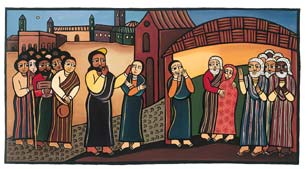
Worship this Sunday at The Table will be rooted in John 9.1-41. Read the full text here.
Having said this, [Jesus] spit on the ground, made some mud with the saliva, and put it on the man’s eyes…So the man went and washed, and came home seeing (John 9.6-7).
Jesus heals a man born blind in this story. Why mud? How would you describe your own spiritual sight these days? What might be hindering or even blocking your vision? The rest of the narrative focuses on interactions with the Pharisees regarding sin, the Sabbath, and the healing. When has your own faith been at odds with the faith of other religious leaders? What was that like for you?
For those in Kitchen Tables studying this text, what topics or questions came up during your gatherings this week?

One Comment
Delilah/The Table on Tap
I was all over the place with this scripture. I had read it over and over again, and I couldn’t make it make sense.
We respected the disciple’s question about who’s sin was causing the blindness. Maybe it was a cultural question…in order to move forward (whether healing or excluding this person from their community?) they had to know “who did it?”
One of the things that stuck out was verse 39 – Jesus said, “For judgment I have come into this world, so that the blind will see and those who see will become blind.”
An interpretation was that those who knew the law were “see”ers and would be made blind or basically need Jesus. Those who didn’t know the law, or Gentiles, were “blind” and would see or basically need Jesus. Jesus came for EVERYONE. Just like his message was the same for the Samaritan woman and the disciples.
This brings us hope – regardless of how “blind” we are, or how much we “see”, Jesus came down here for us.
Join us next week for more scriptural discussion – Mondays, 8 pm, Old Soul @ 40 Acres (Broadway and 34th St)